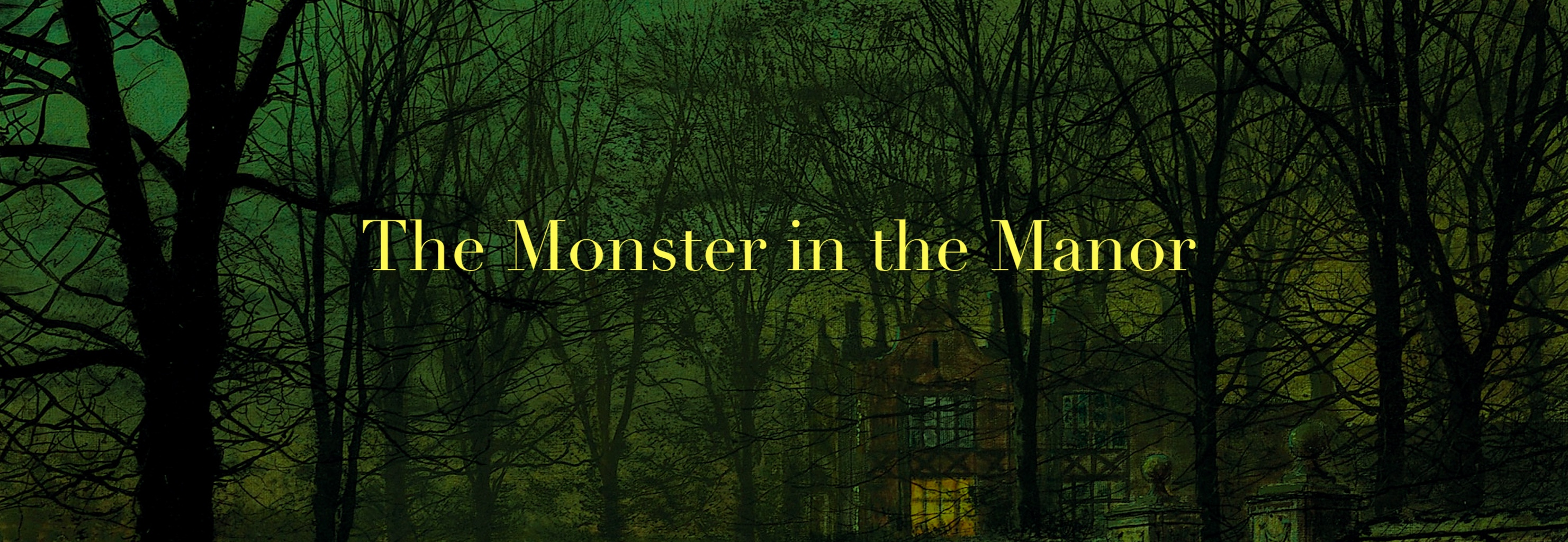Fairy Tales 🧚 Black Diamond, Alberta
The Monster in the Manor
Walking up the road to Le Triste Manor one might be tempted to imagine that Edgar Allen Poe had imprinted his visions into the mind of an innocent wanderer in the dark. One might imagine that this wanderer was a beautiful young woman with a pretty dark hat calling on friendly neighbours.
This was a lady in black. One might even hope that she would bring redemption to the blind nations, to all the shape-shifting beings who were flooding the world, and even to the most fallen of angels.
The night was falling, the rain had subsided, and the moon was high in the sky. One could imagine that it might light her way.
One might even imagine that a tinkerbell were hovering up above somewhere, with a wand of Light. And that no matter what happened on Hamlet’s dark promontory that we call the earth, it would be OK. As if by magic.
Inside the manor, beneath the Turnpike of Sullied Water, Antonio had built his own temple to the fallen gods. Between the pillars of grey marble, the moon shone on the alabaster faces of Ereshigal, Hyperion, Osiris, Satan, Nephilim, Belial, Zabaniyya, Ravanna, Amdusius, Djall, Erlik, and Hephaestus. The deities who once soared in air or pummeled the deep were now mounted on marble thrones. Antonio could open the door to this temple, or shut it whenever he pleased.
The room was circular, with one deity on each of the twelve outer segments of the circle. Between the statues and the centre of the temple was a cobble floor, with grey and dark blue stones set in dark mortar. In the centre of the room there was nothing. A charcoal-black pulse emanated from the black mortar of the floor.
One might have expected in the middle of the room a ruby-studded statue of Lucifer, Beelzebub, Ahriman, or some other harrowing spirit. But such an expectation could only spring from a deep misunderstanding of theology. At the core of evil stands nothing. The absence of Light, form, or possibility. A black hole that swallows the light around it so completely that no one can fathom its cause. No one can guess the nature of its game.
🧚
The Morning Star
Antonio closed the door of the Ebony Chamber and walked slowly into his living room, with its slate fireplace and its teak walls covered with the antlers of beasts he had shot on earth. Other creatures floated in vacuumed bubbles, captive yet still breathing the turquoise or pulsing air of their faraway lands.
Antonio knew that Güsfreude was on her way. He could see her walking like the spirit of Redemption itself up the cobbled road. He merely shrugged, and poured himself a glass of 1805 brandy. After sliding his feet into his sheepskin slippers, he sunk into a wide leather armchair across from the roaring fire.
Earlier that day he had intercepted a highly coded-message from Fallar Prime. It was sent over a wavelength messenger service called The Morning Star. The Fallarians had developed an encoding system based on the finest conjunctures of chaos which even the Vicinese couldn’t crack.
The news bulletin said that several operatives had been sent to contact Baulomorphs and Remainers in the hope that they might be a conduit for the penetration of Fallarian power in the Violet Hoop. The Dark Council made a rare threat, one that hadn’t been made since before the Anarchist Revolt two hundred years earlier: the casual slaughter of Baulians would be met with impromptu firing squads from the rear. Instead of using lethal force, Fallarians were to infiltrate, insinuate, and, if possible, convert disaffected Baulomorphs and Remainers. They were to offer unfettered freedoms in exchange for information, vowing all the while to be messengers of radical democracy and the right to do whatever you want. Officially, they were to tell other species that the goal of Fallar Prime was to end the dictatorship of the Baulian Empire. Unoffically, their goal was to slaughter the inferior races or enslave them so that, finally, the Fallarians could do whatever they wanted.
Antonio was only 62 years old (still an adolescent by Fallarian standards) yet his star had burned very brightly. He was also the most dangerous of Fallarians: an adolescent with all the rage and rebellion that characterized adolescents all over the Kraslika. While it’s true that there were some worlds in which adolescents did exactly what their parents said, Fallarians considered those to be backward, tyrannical places. The only thing to do with those worlds was to ignore them or to use them as testing grounds for new weapon systems.
Antonio didn’t like being told to be diplomatic. As long as he was furthering the cause of anarchy, why should anyone tell him how to go about it? The Black Pulse could go to hell, as far as he was concerned. While he agreed with their ends, he had a different view of the means.
In any case, he wasn’t very interested in their political intrigues. The only thing he cared about was the trajectory of Güsfreude, how she got to the Star and back, and how he could pinpoint its exact location. Knifestream was sure to be interested in his latest data.
🧚
Next: 🗽 Rablanar & the OC
Contents - Characters - Glossary: A-F∙G-Z - Maps - Storylines




